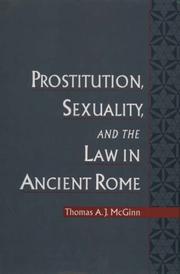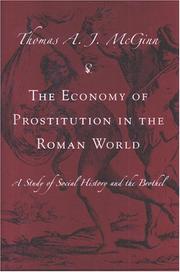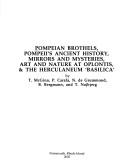| Listing 1 - 9 of 9 |
Sort by
|

ISBN: 0195087852 0585304882 9786611196578 1280532653 1281196576 9786610532650 019802486X 1602569363 9780585304885 0195161327 9780195161328 9780195087857 9781280532658 9780199789344 0199789347 6611196579 9781281196576 6610532656 9781602569362 Year: 1998 Publisher: New York: Oxford university press,
Abstract | Keywords | Export | Availability | Bookmark
 Loading...
Loading...Choose an application
- Reference Manager
- EndNote
- RefWorks (Direct export to RefWorks)
A study of the legal rules affecting the practice of female prostitution in Rome from approximately 200 BC to AD 250, this text examines the formation and content of the legal norms, developed for those in this profession.
Prostitutie (Romeins recht) --- Prostitution (Droit romain) --- Prostitution (Roman law) --- Prostitution --- Prostitutes --- Protituées --- Social conditions --- Droit romain --- Conditions sociales --- Social conditions. --- Prostitution (Roman law). --- Electronic books. -- local. --- Prostitutes -- Rome -- Social conditions. --- Prostitution -- Rome. --- Law - Non-U.S. --- Law, Politics & Government --- Law - Europe, except U.K. --- Protituées --- Female prostitution --- Hustling (Prostitution) --- Prostitution, Female --- Sex trade (Prostitution) --- Sex work (Prostitution) --- Street prostitution --- Trade, Sex (Prostitution) --- White slave traffic --- White slavery --- Work, Sex (Prostitution) --- Call girls --- Female prostitutes --- Girls, Call --- Harlots --- Hookers (Prostitutes) --- Hustlers (Prostitutes) --- Street prostitutes --- Streetwalkers --- Strumpets --- Tarts (Prostitutes) --- Trollops (Prostitutes) --- Whores (Prostitutes) --- Women prostitutes --- Sex-oriented businesses --- Brothels --- Pimps --- Procuresses --- Red-light districts --- Sex crimes --- Roman law --- Sex workers --- Rome --- Prostitution - Rome --- Prostitutes - Rome - Social conditions --- Sex work
Book
ISBN: 9780472118434 0472118439 9780472028573 047202857X 1299159826 9781299159822 Year: 2014 Volume: v. 33 Publisher: Ann Arbor: University of Michigan press,
Abstract | Keywords | Export | Availability | Bookmark
 Loading...
Loading...Choose an application
- Reference Manager
- EndNote
- RefWorks (Direct export to RefWorks)
Explores a fundamental building block of Roman life.
Obligations (droit romain) --- Contrats (droit romain) --- Contracts (Roman law) --- Contracts (Roman law). --- Obligations (Roman law) --- Obligations (Roman law). --- Romeins recht. --- Römisches Recht. --- Schuldrecht. --- Roman law --- Obligations (Roman law) - Congresses --- Contracts (Roman law) - Congresses

ISBN: 1282555952 9786612555954 0472025821 9780472025824 9781282555952 6612555955 9780472113620 0472113623 Year: 2004 Publisher: Ann Arbor (Mich.) University of Michigan Press
Abstract | Keywords | Export | Availability | Bookmark
 Loading...
Loading...Choose an application
- Reference Manager
- EndNote
- RefWorks (Direct export to RefWorks)
In recent years, a number of classical scholars have turned their attention to prostitution in the ancient world. Close examination of the social and legal position of Roman meretrices and Greek hetairai have enriched our understanding of ancient sexual relationships and the status of women in these societies. These studies have focused, however, almost exclusively on the legal and literary evidence.McGinn approaches the issues from a new direction, by studying the physical venues that existed for the sale of sex, in the context of the Roman economy. Combining textual and material evidence, he provides a detailed study of Roman brothels and other venues of venal sex (from imperial palaces and privates houses to taverns, circuses, and back alleys) focusing on their forms, functions, and urban locations.The book covers the central period of Roman history, roughly from 200 B.C. to A.D. 250. It will especially interest social and legal historians of the ancient world, and students of gender, sexuality, and the family.
Prostitution --- Female prostitution --- Hustling (Prostitution) --- Prostitution, Female --- Sex trade (Prostitution) --- Sex work (Prostitution) --- Street prostitution --- Trade, Sex (Prostitution) --- White slave traffic --- White slavery --- Work, Sex (Prostitution) --- Sex-oriented businesses --- Brothels --- Pimps --- Procuresses --- Red-light districts --- Sex crimes --- History --- Economic aspects --- Sex work
Book
ISBN: 9780472130436 0472130439 9780472123025 Year: 2017 Publisher: Ann Arbor : University of Michigan Press
Abstract | Keywords | Export | Availability | Bookmark
 Loading...
Loading...Choose an application
- Reference Manager
- EndNote
- RefWorks (Direct export to RefWorks)
The essays composing Ancient Law, Ancient Society examine the law in classical antiquity both as a product of the society in which it developed and as one of the most important forces shaping that society. Contributors to this volume consider the law via innovative methodological approaches and theoretical perspectives—in particular, those drawn from the new institutional economics and the intersection of law and economics. Essays cover topics such as using collective sanctions to enforce legal norms; the Greek elite's marriage strategies for amassing financial resources essential for a public career; defenses against murder charges under Athenian criminal law, particularly in cases where the victim put his own life in peril; the interplay between Roman law and provincial institutions in regulating water rights; the Severan-age Greek author Aelian's notions of justice and their influence on late-classical Roman jurisprudence; Roman jurists'approach to the contract of mandate in balancing the changing needs of society against respect for upper-class concepts of duty and reciprocity; whether the Roman legal authorities developed the law exclusively to serve the Roman elite's interests or to meet the needs of the Roman Empire's broader population as well; and an analysis of the Senatus Consultum Claudianum in the Code of Justinian demonstrating how the late Roman government adapted classical law to address marriage between free women and men classified as coloni bound to their land
Droit grec --- Droit romain --- Law, Greek --- Law, Greek. --- Roman law --- Roman law. --- Histoire. --- History. --- Greek law --- Law, Ancient --- History

ISBN: 0195161858 0195161866 9780195161854 9780195161854 9780195161861 Year: 2004 Volume: 5
Abstract | Keywords | Export | Availability | Bookmark
 Loading...
Loading...Choose an application
- Reference Manager
- EndNote
- RefWorks (Direct export to RefWorks)
The Roman household (familia) was in many respects dramatically different from the modern family. From the early Roman Empire (30 BC to about AD 250) there survive many legal sources that describe Roman households, often in the most intimate detail. The subject matter of these ancient sources includes marriage and divorce, the property aspects of marriage, the pattern of authority within households, the transmission of property between generations, and the supervision of Roman orphans. This casebook presents 235 representative texts drawn largely from Roman legal sources, especially "Justinian's Digest". These cases and the discussion questions that follow provide a good introduction to the basic legal problems associated with the ordinary families of Roman citizens. The arrangement of materials conveys to students an understanding of the basic rules of Roman family law while also providing them with the means to question these rules and explore the broader legal principles that underlie them. Included cases invite the reader to wrestle with actual Roman legal problems, as well as to think about Roman solutions in relation to modern law.In the process, the reader should gain confidence in handling fundamental forms of legal thinking, which have persisted virtually unchanged from Roman times until the present. This volume also contains a glossary of technical terms, biographies of the jurists, basic bibliographies of useful secondary literature, and a detailed introduction to the scholarly topics associated with Roman family law.
Domestic relations (Roman law) --- Famille (Droit romain) --- Gezin (Romeins recht) --- Familles --- Droit romain --- Roman law

ISBN: 1887829474 Year: 2002 Volume: 47
Abstract | Keywords | Export | Availability | Bookmark
 Loading...
Loading...Choose an application
- Reference Manager
- EndNote
- RefWorks (Direct export to RefWorks)
Excavations (Archaeology) --- Excavations, Archaeology --- Pompeii (Extinct city). --- Pompeii (Extinct city) --- Torre Annunziata (Italy) --- Herculaneum (Extinct city) --- Social life and customs. --- Antiquities, Roman. --- Herculaneum (Extinct city). --- Archaeological digs --- Archaeological excavations --- Digs (Archaeology) --- Excavation sites (Archaeology) --- Ruins --- Sites, Excavation (Archaeology) --- Archaeology --- Ercolano (Extinct city) --- Herculaneum (Ancient city) --- Italy --- Pompei (Extinct city) --- Pompeii (Ancient city) --- Torre Annunziata, Italy --- Antiquities --- Social life and customs --- Antiquities [Roman ]
Book

ISBN: 9781400827374 Year: 2009 Publisher: Princeton, NJ
Abstract | Keywords | Export | Availability | Bookmark
 Loading...
Loading...Choose an application
- Reference Manager
- EndNote
- RefWorks (Direct export to RefWorks)


ISBN: 9781400827374 9780691009926 Year: 2009 Publisher: Princeton, N.J. Princeton University Press
Abstract | Keywords | Export | Availability | Bookmark
 Loading...
Loading...Choose an application
- Reference Manager
- EndNote
- RefWorks (Direct export to RefWorks)
Book

ISBN: 9788867353323 9788867353811 9788867353828 9788867353835 9788867353842 9788867353859 9788867353866 9788867353873 Year: 2016 Publisher: Tricase : Libellula,
Abstract | Keywords | Export | Availability | Bookmark
 Loading...
Loading...Choose an application
- Reference Manager
- EndNote
- RefWorks (Direct export to RefWorks)
| Listing 1 - 9 of 9 |
Sort by
|

 Search
Search Feedback
Feedback About UniCat
About UniCat  Help
Help News
News